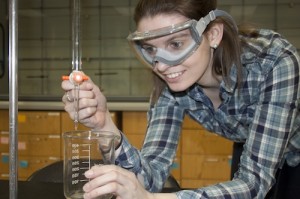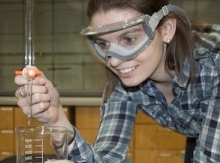A publication in a scholarly journal is a proud moment in any professional’s life, but for St. Thomas junior Sara Diener, it’s already a reality.

Diener, a chemistry education major, spent the last year studying abroad at the University of Leeds in England, researching with inorganic chemistry professor Malcolm Halcrow.
After months of research on chemical complexes, her work was submitted and eventually published in Dalton Transactions, an international journal of inorganic chemistry.
“The goal of this project was to create new spin-transition compounds that can be used as switchable devices in display and memory devices, medical imaging, switchable polymers or liquid crystals,” Diener explained.
A spin-transition chemical is an electron that can go from one stable state to another stable state reversibly. Although she discovered that the compounds she worked with were not spin-crossover molecules, she said they still have the potential to be used in coordination chemistry, supramolecular chemistry or crystal engineering.
Diener said it is a great feeling to have her work recognized.
“It was amazing,” she said. “I’m still an undergrad yet I’m influencing other people’s scientific work, which is really cool.”
Diener said that the research was not an easy process.
“I had trouble with the ligands,” she admitted. “They were very complex, so we kept working on those and trying different ways. I did four different steps for that, and it never actually worked.”
She said that the most difficult part of publishing her studies was finding a research process that worked.
“It took me 10 weeks to find something that worked, and it was actually really lucky,” Diener said.
Anthony Borgerding, chemistry associate professor and head of the St. Thomas chemistry department, said completing the project was no problem for Diener.
“She’s motivated, that’s for sure,” Borgerding said. “She has foresight about her.”
After completing the research, Diener said the next step was to find a publisher who would be interested in the findings.
“For me, that was easy because my professor had published stuff before with this publishing company,” she said.
However, Diener admitted that being the only undergraduate student in a lab with Ph.D. candidates wasn’t easy.
“That was really nerve-wracking, but I learned a lot from them. They were super helpful,” Diener said. “I gained a lot from being completely overwhelmed at first.”
She said the most important thing she learned from this experience was to always keep trying.
“Just don’t give up. When you think nothing is going to happen and you’re frustrated with it and you want to give up, something usually happens,” she said.
Diener, formerly just a chemistry major, said that although the research was rewarding, her time in England gave her a new perspective on what she wants to do after graduation. She made the decision to switch to chemistry education when she returned to St. Paul this spring.
“It’s good to have that (experience) when you’re teaching to show students that there are cool opportunities that they can do with chemistry,” she said.
Borgerding agreed that the experience was instrumental in helping Diener decide between a future spent teaching in a classroom or researching in a laboratory.
“She’s a really bright student and really skilled in a lot of ways,” he said. “For her personality, she recognized that her skills would probably be better put to use teaching directly.”
Baihly Warfield can be reached at warf3860@stthomas.edu.



